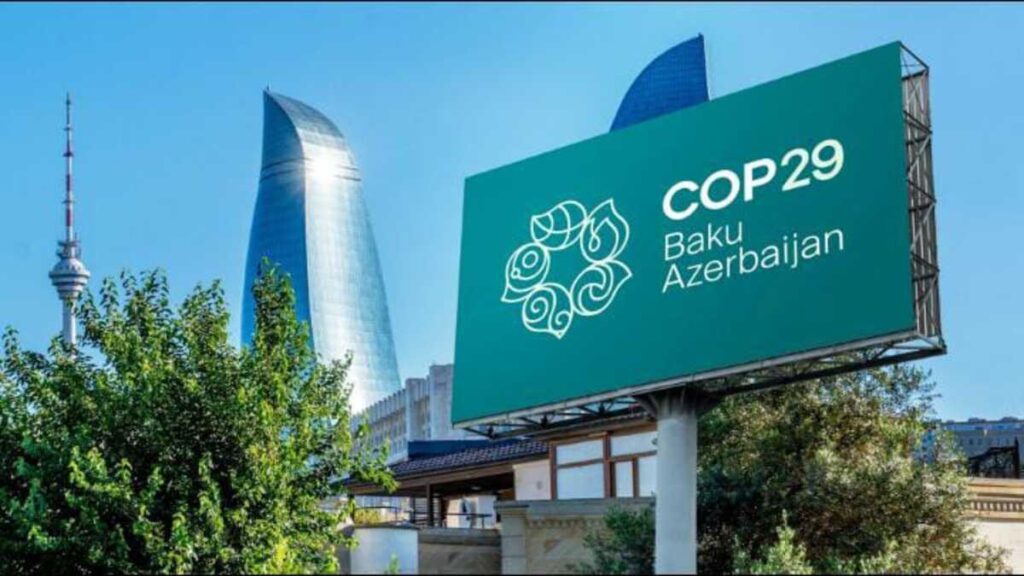As COP29 unfolds in Baku, Azerbaijan, the spotlight is firmly on Africa, where leaders are advocating for urgent reforms in climate financing to address the continent’s escalating climate crisis. African nations are calling for an ambitious annual commitment of $1 trillion in adaptation funding by 2030, a demand underscored by the devastating impacts of climate change already felt across the region.

Kenya’s Prime Cabinet Secretary Musalia Mudavadi, representing President William Ruto, articulated this urgent need during the conference’s opening. He emphasized that current financial structures are inadequate and called for a comprehensive overhaul to make climate finance more accessible and equitable.
“We expect a re-engineering of the financial architecture to ensure it is more friendly and effective,” Mudavadi stated, highlighting the necessity for a system where polluters bear a greater financial burden while those most affected by climate change receive appropriate compensation.
The urgency of these discussions cannot be overstated. With Africa contributing minimally to global greenhouse gas emissions yet suffering disproportionately from climate impacts such as severe droughts and catastrophic floods the call for justice is resonating loudly. Murtala Touray of Greenpeace Africa noted that while African communities have contributed least to the climate crisis, they are among those bearing its heaviest burdens.
“Without scaled-up climate finance that is fit for purpose, most African countries will be unable to deliver on their Nationally Determined Contributions (NDCs),” he warned.
The conference, aptly dubbed the “Finance COP,” aims to establish a New Collective Quantified Goal (NCQG) to replace the previous $100 billion annual commitment made by developed countries in 2009. However, negotiations have been fraught with challenges, including disagreements over funding amounts and accountability mechanisms. Experts estimate that emerging and developing countries excluding China will need to mobilize $1 trillion annually through 2030 from international sources to support their climate action efforts.
Kenya’s delegation is advocating for significant reforms in how climate finance is allocated and accessed. Environment Cabinet Secretary Aden Duale echoed Mudavadi’s sentiments, stressing that wealthier nations must contribute more substantially to tackle these pressing challenges. The call for a Climate Damages Tax on fossil fuel companies has gained traction as a potential source of funding for loss and damage reparations.
One critical issue hampering effective climate action in Africa is the high cost of capital for renewable energy projects. Currently, the average cost of capital for power projects in Africa is three times higher than in other regions, making it difficult for countries to attract necessary investments. Despite possessing 40% of the world’s solar potential, Africa has received only 2% of global renewable energy investments. This stark disparity highlights the need for structural changes in global financing mechanisms to ensure that funds flow where they are most needed.
Mudavadi also called for simplifying access to carbon credits, which could provide additional revenue streams for African nations seeking to offset emissions through carbon trading mechanisms.
“We are looking forward to a streamlined process that facilitates easier access to carbon credits without complications,” he stated.
The consequences of inadequate climate financing are dire. According to Amnesty International, millions have already been displaced due to climate-related disasters across Africa. The organization emphasizes that wealthier nations must fully commit to financing adaptation measures and addressing loss and damage caused by climate change. Current pledges fall significantly short of the estimated $400 billion needed by lower-income countries by 2030.
As discussions progress at COP29, African leaders are urging their counterparts from wealthier nations not only to meet their financial commitments but also to ensure that these funds are distributed equitably based on need. This includes addressing systemic poverty and underdevelopment, which hinder effective climate action across the continent.
With 2024 projected to be one of the hottest years on record, the urgency of these discussions cannot be overstated. Every year of inaction commits the planet to more severe weather events and humanitarian crises. As world leaders gather in Baku, there is hope that COP29 will not only set ambitious financial targets but also foster genuine partnerships between national governments, private sectors, and international development agencies.
The stakes are high: failure to act decisively could lead to catastrophic consequences not just for Africa but for the entire planet. As Mudavadi succinctly put it:
“Polluters should pay more, and those who suffer the consequences of climate change should be compensated.”
The world watches as African nations strive not only for justice but also for a sustainable future amid an ever-worsening climate crisis.



















